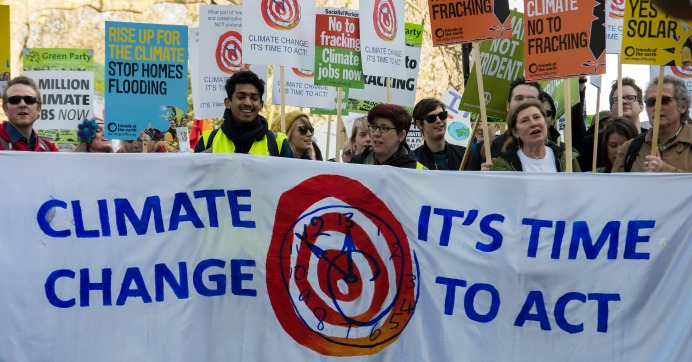
"Humanity will look back on Nov. 4, 2016, as the day that countries of the world shut the door on inevitable climate disaster," UN climate chief Patricia Espinosa and Moroccan Foreign Minister Salaheddine Mezouar said in a joint statement.
Join Leonardo DiCaprio as he explores the topic of climate change, and discovers what must be done today to prevent catastrophic disruption of life on our planet.

New study says that unless nations ramp up their carbon-reduction pledges before 2020, it will be nearly impossible to keep warming to 2 degrees.

A new study shows that three of the Amundsen sea’s frozen gateways are melting away faster than we realised, raising the spectre of an ice sheet collapse that could trigger a metre of global sea level rise.

With atmospheric carbon dioxide concentrations having reached 400 ppm 2015 and with no signs of them abating in 2016 the World Meteorological Organization (WMO) said that "a new era of climate change reality" is upon us.

United Nations Environment Programme have welcomed the landmark deal struck today by nearly 200 countries to reduce the emissions of potent chemicals used in air conditioners and refrigerators.

The deal encourages airlines to buy credits through global carbon markets to offset their emissions.

Levels of the planet's three most dangerous greenhouse gases are rising, and fossil fuels must be taxed to protect children from the turmoil of rising seas and extreme storms, a US climate scientist warns.

Carbon dioxide just hit its annual minimum and failed to dip below 400 ppm.

What if I told you the world could take one action this year that would shave off a half a degree Celsius of warming from our overheating planet? Leaders have a chance when they meet in Rwanda next month to secure a phase-down of hydrofluorocarbons (HFCs).

Al Gore believes we are in a turning point in the fight against climate change. It will be bigger than the industrial and information revolutions combined.

In what's being seen as a huge step forward in the effort to curb climate-warming emissions, the United States and China have ratified the Paris global climate agreement. Other countries are now expected to follow suit.

High above Earth's tropics, a pattern of winds changed recently in a way that scientists had never seen in more than 60 years of consistent measurements.

Another day, another dire warning about the global climate emergency. NASA's top climate scientist announced Tuesday that the Earth is warming at a pace not seen in at least the past 1,000 years.

New law requires the US economic powerhouse to cut its emissions by 40% below 1990 levels by 2030